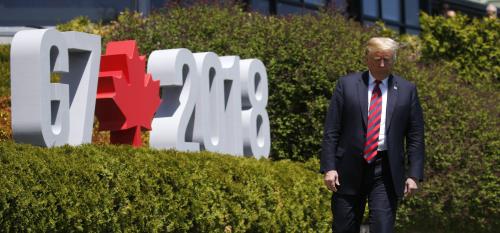Washington’s closest allies cite facts, logic, and international standards to push back against what they see as flawed, even dangerous, U.S. policy proposals. The U.S. president and his aides selectively read the analysis to justify the desired outcome and claim national security imperatives. The president chooses to proceed, breaking with close partners. The breach prompts taunts that compound the fraying of traditionally amicable and strategic relations. This is a familiar story under the Trump administration, but not one without precedents.
In 2003, France under Jacques Chirac was the active, vocal leader of countries opposed to the U.S. insistence on invading Iraq. Chirac’s skepticism provoked charges of cowardice and betrayal in Washington (freedom fries, anyone?). The comparison with today is not exact, since (as astonishing as it seems today) the United States was not then as much an outlier as now. George W. Bush persuaded some countries to sign up for the Iraq adventure. Of the then-G-8 countries, the United Kingdom, Italy, and Japan joined Operation Iraqi Freedom in various stages of enthusiasm (U.K.) or not. Chirac’s France, Gerhard Shroeder’s Germany, and Paul Martin’s Canada—along with Russia—kept their distance. While few would lament Saddam Hussein’s enforced departure, we know now how well that war turned out.
Today’s trans-Atlantic crisis again appears to be an American-imposed one, deriving from presidential obsessions unrooted in facts. Yet a significant difference threatens to make the current rift more lasting and damaging to U.S. leadership and interests. By 2004, only a year into the Iraq war, both Jacques Chirac and George W. Bush were seeking ways to restore the bilateral relationship and, through that, the productivity of the traditional Western alliance mechanisms. Their success in doing so underscores their own strategic vision as well as the utility of well-timed summits. Their unlikely partnership stands in contrast with President Trump’s disastrous performance at the recent G-7 summit.
That was then
In June 2004, Bush and Chirac met on the margins of two high-profile events: the ceremonies in France marking the 60th anniversary of D-Day and the G-8 summit (with Russia then a member) in Sea Island, Georgia. Pre-Twitter media coverage in advance of these events highlighted the continuing Paris-Washington (and Berlin-Washington) animosity over Iraq. But while the differences over Iraq had not evaporated, the media and pundits had fallen behind, missing the clues of an alliance about to be restored to productive working order.
In meetings on the margins of both events, Chirac pitched the restoration of the independence and sovereignty of Lebanon as a common cause he and Bush could both support. Lebanon, in summer 2004, was firmly in Syria’s grips, with Lebanon’s dysfunctional governing institutions subservient to Syria’s resident intelligent chief and to Hezbollah. Chirac, close to Lebanon’s Prime Minister Rafik Hariri, hoped to tip the scales of influence in Lebanon toward his friend Hariri and away from the preposterous pro-Syrian Lebanese president. Bush’s loathing of Bashar al-Assad’s Syria and Iran’s regional influence was well known. Chirac successfully appealed to Bush that Lebanon could be a venue for pushing back against both.
Their motivations were different, but the two presidents embraced a common goal: Syria out of Lebanon. Voila, after the Iraq war, another Middle Eastern country with internal confessional divides and external proxy influences became the engine to restart the Franco-American partnership. For the next two years and beyond, French and American officials worked hand-in-hand in building international support for the Bush-Chirac vision of an independent, democratic, and sovereign Lebanon. One could accuse them of being merely transactional over a country with more symbolic than actual importance to either. But the transaction was rooted in a shared strategic vision, of shoring up the larger alliances that served Western interests and that had been battered by the Iraq war. In one sense, the Bush-Chirac Lebanon policy ultimately failed, with a more powerful Hezbollah now filling the vacuum of the vacated Syrian military and intelligence assets. But Lebanon as a vehicle to move Washington and Paris beyond their Iraq differences succeeded as Bush and Chirac intended.
The Bush-Chirac meetings represent the potential value of summits. Even in discounting the usual hyperbole of summitry, a review of the decisions taken on Sea Island in 2004 reflect a determination by Bush and Chirac, and the other G-8 leaders, for a constructive approach (and undoubtedly also represents months of tough preparatory diplomacy): among other things, an action plan to reinvigorate U.N. peacekeeping through a five-year training program; initiatives to combat HIV and famine and eradicate polio; the establishment of the Forum for the Future to bring together G-8 and Middle East officials, together with civil society, to promote political and economic reform; and the extension of a program to address the needs of heavily indebted least-developed countries.
Surely the meetings at the Normandy and Sea Island summits did not alter the views of either Chirac or Bush regarding the 2003 Iraq war. Bush saw it as essential to U.S. security, and Chirac viewed it as a calamitous mistake and violation of international law. But with the U.S.-led invasion then a reality more than a year old, both leaders made a conscious decision to transcend their differences, find common ground, and move forward on other parts of the international agenda. Whatever personal animosity or feelings of betrayal each may have felt toward the other were secondary to the necessity of cultivating the essential Western alliance. Bush and his advisors at Sea Island understood that U.S. security cannot be sustained by simply going it alone, all the time. U.S. power and leadership are compounded by the interlocking and non-coercive alliances and partnerships that adversaries like Russia could only dream of.
Whatever personal animosity or feelings of betrayal each may have felt toward the other were secondary to the necessity of cultivating the essential Western alliance.
This is now
Trump’s differences with his Western allies go beyond any single issue. One or two summits won’t resolve them. But Charlevoix was a missed opportunity to reverse a downward spiral in how our closest allies view U.S. reliability and leadership. By playing the aggrieved and angry victim, Trump abdicated the usual role of the U.S. president in setting the agenda and outcome of such events. Had he followed the model of his predecessors, he would have strengthened his hand in advance of the summit with Kim Jong-un by demonstrating that he leads, and is supported by, the world’s most advanced economies.
The Hippocratic Oath of “do no harm” applies to diplomacy as well as to medicine. Trump ignores that and many other principles at the peril of U.S. interests. One suspects that Canada’s Justin Trudeau and France’s Emmanuel Macron, in the aftermath of Charlevoix, will not be so eager to find ways to transcend their differences with Trump as Chirac did with Bush. On top of the bad manners of gratuitously insulting one’s host, Trump’s demeanor and behavior demonstrate not only a lack of interest in alliances and partnerships but a lack of comprehension as to why they have been so important to U.S. global leadership.
One of the U.S. officials in the delegation to the 2004 Sea Island G-8 Summit was Assistant Secretary of State for Arms Control and International Security John Bolton. One wonders if National Security Advisor Bolton truly believes that U.S. security is enhanced by shunning and humiliating close allies at summits, compared to the Bush-Chirac approach of using Sea Island to reinvigorate the partnerships that have served this country as force multipliers so well for decades.






Commentary
The right way and the wrong way to conduct summit diplomacy
June 18, 2018